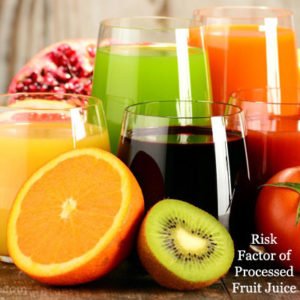Fruit juice, a popular beverage among all age groups, is often perceived as a healthy alternative to carbonated drinks. While homemade fruit juice can indeed be beneficial due to its raw and natural form, the same cannot be said for commercially produced fruit juice. This article aims to shed light on the potential health risks associated with the consumption of commercial fruit juice, highlighting the Top 11 Risk Factors that could impact the Human Body.

The Hidden Dangers of Commercial Fruit Juice
Commercial fruit juice, often advertised as a healthy beverage, is frequently laden with added sugars and preservatives, which can negatively impact health. Here are some key risks associated with commercial fruit juice consumption:
- Excessive Sugar: Many commercial fruit juices contain added sugar, contributing to health issues like obesity, heart disease, diabetes, depression, migraines, and even cancer. The American Heart Association advises limiting added sugars to no more than half of your daily discretionary calories.
- Fructose Overload: Fructose, a sugar found in fruit, is frequently added to commercial fruit juice to increase its sweetness. However, consuming fructose in excess can strain the liver, leading to metabolic disorders.
- Phosphoric Acid: This preservative, often used to extend commercial fruit juice’s shelf life, can erode teeth and bones and heighten kidney disease risk.
- Sodium Benzoate: This preservative can cause health complications such as asthma, high blood pressure, kidney disease, and allergic reactions in children.
- Monosodium Glutamate (MSG): MSG is commonly added to commercial fruit juice to enhance its flavor. However, it can induce migraines, cause brain damage, and lead to depression.
- Aspartame: This artificial sweetener, frequently added to commercial fruit juice, can cause health problems such as heart attacks, anxiety, nausea, and depression.
In conclusion, while commercial fruit juice may seem like a healthy choice, it often contains harmful additives. Consumers should be aware of these hidden dangers and consider healthier alternatives, such as fresh, homemade fruit juice or whole fruits.
The Health Impact of Commercial Fruit Juice
The consumption of commercial fruit juice, a common beverage choice for many, can have several adverse health effects. These health issues stem from the high content of sugars, preservatives, and other additives often found in these products.
- Obesity: Firstly, Obesity is a significant concern. Commercial fruit juices are typically high in sugar, which can lead to an excessive calorie intake. Over time, this can contribute to weight gain and obesity, a condition associated with numerous health problems.
- Kidney Disease: Secondly, these juices can contribute to Kidney Disease. The preservatives and sugars present can disrupt the normal functioning of the kidneys, potentially leading to kidney disease. This disruption can be harmful, as the kidneys play a crucial role in filtering waste products from the blood.
- Heart Disease: Thirdly, Heart Disease risk can increase due to the high sugar and sodium content in commercial fruit juice. These components can lead to increased blood pressure and cholesterol levels, both of which are risk factors for heart disease.
- Cancer: Fourthly, the risk of Cancer can increase due to the high levels of sugar, sodium, and preservatives. These substances can cause cellular damage, potentially leading to the development of cancerous cells.
- Liver Damage: Lastly, Liver Damage is another potential risk. The high fructose content in commercial fruit juice can put significant pressure on the liver, leading to liver damage over time. This damage can impair the liver’s ability to detoxify the body, leading to further health complications.
In conclusion, while commercial fruit juice may seem like a healthy choice, its consumption can lead to several health issues, including obesity, kidney disease, heart disease, cancer, and liver damage. Therefore, it’s essential to consume these products in moderation and opt for healthier alternatives when possible.
Choosing Healthier Alternatives
While commercial fruit juice can pose several health risks, there are healthier alternatives available. Opting for homemade fruit juice or consuming whole fruits can provide the essential nutrients without the added sugars and preservatives. When purchasing fruit juice from the market, it’s important to check for government approval or certification by a reputable health organization.
Finishing Touch
While fruit juice can be a refreshing and convenient beverage, it’s important to be aware of the potential health risks associated with commercially produced fruit juice. By making informed choices and opting for healthier alternatives, we can enjoy the benefits of fruits without compromising our health.
